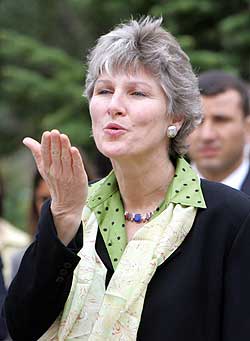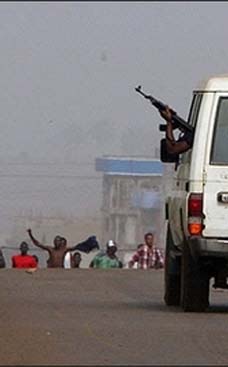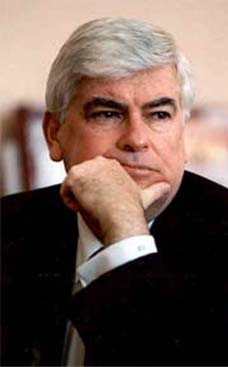2005.07.27: July 27, 2005: Headlines: Speaking Out: Public Diplomacy: Washington Post: Anne Applebaum writes: Think Again, Karen Hughes
Peace Corps Online:
Peace Corps News:
Speaking Out:
January 23, 2005: Index: PCOL Exclusive: Speaking Out (1 of 5) :
Speaking Out - New Stories:
2005.07.27: July 27, 2005: Headlines: Speaking Out: Public Diplomacy: Washington Post: Anne Applebaum writes: Think Again, Karen Hughes
Anne Applebaum writes: Think Again, Karen Hughes

Hughes takes over the least noticed, least respected and possibly most important job in the State Department. Her formal title is undersecretary of state for public diplomacy and public affairs. In plain English, her job is to fight anti-Americanism, promote American culture and above all to do intellectual battle with the ideology of radical Islam, a set of beliefs so powerful that they can persuade middle-class, second-generation British Muslims to blow themselves up on buses and trains.
Anne Applebaum writes: Think Again, Karen Hughes
Think Again, Karen Hughes
By Anne Applebaum
Wednesday, July 27, 2005; A21
Only two senators were in the room when Karen Hughes testified at her confirmation hearings. When it came time for the Senate Foreign Relations Committee to vote on her nomination yesterday, she was easily approved. And thus with no discussion and no debate, Hughes takes over the least noticed, least respected and possibly most important job in the State Department. Her formal title is undersecretary of state for public diplomacy and public affairs. In plain English, her job is to fight anti-Americanism, promote American culture and above all to do intellectual battle with the ideology of radical Islam, a set of beliefs so powerful that they can persuade middle-class, second-generation British Muslims to blow themselves up on buses and trains.
Presumably, President Bush selected Hughes for this task because she was very good at running his election campaigns. And indeed, in the testimony she gave last week to a nearly empty room, she sounded like she was still running an election campaign. Like Hillary Clinton, she said she wanted people around the world to know that she would be "listening" to them: "I want to learn more about you and your lives, what you believe, what you fear, what you dream, what you value most." Like Jesse Jackson, she deployed alliteration, alluding to the four "E's": "engagement, exchanges, education and empowerment."
Unfortunately, Hughes's most important constituents aren't going to respond to engagement and empowerment, let alone exchange and education, unless the latter involves those flight schools where they don't teach you how to take off or land. It has become clear in Iraq, if it wasn't already, that what we call the "war on terrorism" is in fact a small part of a larger intellectual and religious struggle within Islam, between moderates who want to live in modern countries, and radicals who want to impose their extreme interpretation of sharia , or religious law. So far, most of the money, and most of the "public diplomacy," has been channeled to the radicals. Consider, for example, an extraordinary report published this year by the Center for Religious Freedom, a division of Freedom House, which surveys more than 200 books and pamphlets collected at mosques and Islamic centers in U.S. cities. Most were in Arabic. All were published by the Saudi government or royal family, and all promote the extreme form of Wahhabi Islam found in Saudi Arabia. The books reflect contempt for the United States, condemn democracy as un-Islamic, and claim that Muslims are religiously obliged to hate Christians and Jews. Most insidiously, the documents denounce moderate Muslims, especially those who advocate religious tolerance, as infidels. If a Muslim commits adultery or becomes a homosexual, one pamphlet -- published by the Saudi government's ministry of Islamic affairs -- advises that "it would be lawful for Muslims to spill his blood and take his money."
I am citing this study not merely to finger the Saudis, but also to show what we are up against. The Saudi king's own Web site boasts of his support for mosques and schools in Lagos, Islamabad, Madrid, Buenos Aires and elsewhere. A friend reports recently seeing a new Saudi mosque in Kosovo. We have to assume that the materials found in the United States exist in all of those places, too.
To fight these ideas, friendly state visits from Laura Bush will not suffice. Neither will more Britney Spears songs for Muslim teenagers, which is what we play on U.S.-funded Farsi and Arabic radio in the Middle East. Instead, we need to monitor the intellectual and theological struggle for the soul of Islam, and we need to help the moderates win. This means making sure that counter-arguments are heard whenever and wherever Muslim clerics and intellectuals are talking, despite the impact of Saudi money.
The United States has engaged in a project like this once before. In the 1950s and '60s, the West European left was also bitterly divided, with social democrats on one side and pro-Soviet communists on the other. We backed the social democrats. CIA money was used, for example, to found Encounter, a small but influential magazine whose editors promoted not just pro-Americanism but also the principles of democracy and capitalism, largely through allowing both sides to argue their cases.
I concede that the analogy is not exact, that the present case is far more difficult and that we have a long way to go. At the moment, the State Department probably spends more money denying visas to moderate Muslim scholars than it does funding magazines for them to write in. The traditional tools of public diplomacy -- American libraries, Fourth of July parties, "citizen ambassadors" -- are uniquely unsuited to the task of encouraging debate within Islam as well. But Hughes has nothing to lose by dropping the four "E's," going back to the rest of the alphabet, and thinking way, way outside the box. Judging by Bali, Madrid, London and Sharm el-Sheikh, not to mention New York and Washington, whatever we're doing right now, it isn't working.
applebaumanne@yahoo.com
Links to Related Topics (Tags):
Headlines: July, 2005; Speaking Out; Public Diplomacy
When this story was posted in February 2007, this was on the front page of PCOL:





Peace Corps Online The Independent News Forum serving Returned Peace Corps Volunteers
 | Ron Tschetter in Morocco and Jordan
On his first official trip since being confirmed as Peace Corps Director, Ron Tschetter (shown at left with PCV Tia Tucker) is on a ten day trip to Morocco and Jordan. Traveling with his wife (Both are RPCVs.), Tschetter met with volunteers in Morocco working in environment, youth development, health, and small business development. He began his trip to Jordan by meeting with His Majesty King Abdullah II and Her Majesty Queen Rania Al Abdullah and discussed expanding the program there in the near future. |
 | Chris Dodd's Vision for the Peace Corps
Senator Chris Dodd (RPCV Dominican Republic) spoke at the ceremony for this year's Shriver Award and elaborated on issues he raised at Ron Tschetter's hearings. Dodd plans to introduce legislation that may include: setting aside a portion of Peace Corps' budget as seed money for demonstration projects and third goal activities (after adjusting the annual budget upward to accommodate the added expense), more volunteer input into Peace Corps operations, removing medical, healthcare and tax impediments that discourage older volunteers, providing more transparency in the medical screening and appeals process, a more comprehensive health safety net for recently-returned volunteers, and authorizing volunteers to accept, under certain circumstances, private donations to support their development projects. He plans to circulate draft legislation for review to members of the Peace Corps community and welcomes RPCV comments. |
 | He served with honor
One year ago, Staff Sgt. Robert J. Paul (RPCV Kenya) carried on an ongoing dialog on this website on the military and the peace corps and his role as a member of a Civil Affairs Team in Iraq and Afghanistan. We have just received a report that Sargeant Paul has been killed by a car bomb in Kabul. Words cannot express our feeling of loss for this tremendous injury to the entire RPCV community. Most of us didn't know him personally but we knew him from his words. Our thoughts go out to his family and friends. He was one of ours and he served with honor. |
 | Peace Corps' Screening and Medical Clearance
The purpose of Peace Corps' screening and medical clearance process is to ensure safe accommodation for applicants and minimize undue risk exposure for volunteers to allow PCVS to complete their service without compromising their entry health status. To further these goals, PCOL has obtained a copy of the Peace Corps Screening Guidelines Manual through the Freedom of Information Act (FOIA) and has posted it in the "Peace Corps Library." Applicants and Medical Professionals (especially those who have already served as volunteers) are urged to review the guidelines and leave their comments and suggestions. Then read the story of one RPCV's journey through medical screening and his suggestions for changes to the process. |
 | The Peace Corps is "fashionable" again
The LA Times says that "the Peace Corps is booming again and "It's hard to know exactly what's behind the resurgence." PCOL Comment: Since the founding of the Peace Corps 45 years ago, Americans have answered Kennedy's call: "Ask not what your country can do for you--ask what you can do for your country. My fellow citizens of the world: ask not what America will do for you, but what together we can do for the freedom of man." Over 182,000 have served. Another 200,000 have applied and been unable to serve because of lack of Congressional funding. The Peace Corps has never gone out of fashion. It's Congress that hasn't been keeping pace. |
 | PCOL readership increases 100%
Monthly readership on "Peace Corps Online" has increased in the past twelve months to 350,000 visitors - over eleven thousand every day - a 100% increase since this time last year. Thanks again, RPCVs and Friends of the Peace Corps, for making PCOL your source of information for the Peace Corps community. And thanks for supporting the Peace Corps Library and History of the Peace Corps. Stay tuned, the best is yet to come. |
 | History of the Peace Corps
PCOL is proud to announce that Phase One of the "History of the Peace Corps" is now available online. This installment includes over 5,000 pages of primary source documents from the archives of the Peace Corps including every issue of "Peace Corps News," "Peace Corps Times," "Peace Corps Volunteer," "Action Update," and every annual report of the Peace Corps to Congress since 1961. "Ask Not" is an ongoing project. Read how you can help. |
Read the stories and leave your comments.

Some postings on Peace Corps Online are provided to the individual members of this group without permission of the copyright owner for the non-profit purposes of criticism, comment, education, scholarship, and research under the "Fair Use" provisions of U.S. Government copyright laws and they may not be distributed further without permission of the copyright owner. Peace Corps Online does not vouch for the accuracy of the content of the postings, which is the sole responsibility of the copyright holder.
Story Source: Washington Post
This story has been posted in the following forums: : Headlines; Speaking Out; Public Diplomacy
PCOL34499
71



















